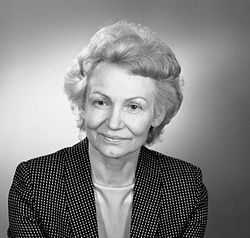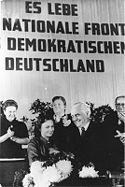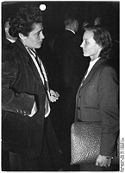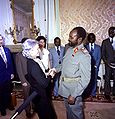- Margot Honecker
-
Margot Honecker 
German Democratic Republic
Minister of EducationIn office
1963–1989Succeeded by Willi Stoph Personal details Born 17 April 1927
Halle, Weimar RepublicPolitical party Socialist Unity Party of Germany Spouse(s) Erich Honecker Children Sonja Honecker Margot Honecker née Feist (born April 17, 1927) is a former Communist politician, who was a prominent member of the political elite in East Germany. From 1963 until 1989, she was Minister of Education ("Volksbildung") of the GDR.
Known for her hardline political views, Honecker was responsible for the enactment of the "Uniform Socialist Education System" in 1965 and mandatory military training in schools. She was also responsible for the forced adoption of children of jailed dissidents or people who attempted to flee from East Germany, which meant that their children were taken away from them and given to communist couples.
She was married to Erich Honecker, the head of state of the GDR. Following the downfall of the communist regime in 1989, she fled to Russia with her husband to avoid criminal charges, but was expelled by the Yeltsin government and subsequently emigrated to Chile.
Contents
Early life
Born in Halle, Margot Feist was the daughter of a shoemaker and a factory worker. After graduating from elementary school, she became a member of the Bund Deutscher Mädel from 1938 to 1945. Her mother died in 1940 when Margot was 13 years old.
Her brother, Manfred Feist, was the department leader for foreign information within the central committee of the SED.[1]
Party worker
 Honecker congratulates Wilhelm Pieck on his election as the first GDR President in 1949.
Honecker congratulates Wilhelm Pieck on his election as the first GDR President in 1949.
In 1945 Margot Feist joined the KPD. A year later, with the coerced merger of the SPD and KPD, she became a member of East Germany's new state party, the SED, working as a shorthand typist with the land board of directors FDGB in Saxony-Anhalt.[1]
In 1946 she became a member of the secretariat for the board of directors of the FDJ in Halle. She then began a meteoric rise through various departments. In 1947 she was the departmental leader of the FDJ's culture and education in the land board of directors and in 1948 secretary of the FDJ's central council as well as chairperson of the Ernst Thälmann Pioneer Organisation.
 Honecker attending the Volkskammer in 1951. During this period she was having an affair with Erich Honecker.
Honecker attending the Volkskammer in 1951. During this period she was having an affair with Erich Honecker.
By 1949/1950 Margot Feist was a member of the GDR's temporary People's Parliament. In 1950 at the age of 22 she was elected as a representative in the newly-founded People's Chamber (German: Volkskammer).[2]
She met her future husband, Erich Honecker, at FDJ meetings when he was the director of the Freie Deutsche Jugend. Honecker was 15 years older and married. When she became pregnant and gave birth to their daughter Sonja in 1952, Honecker divorced his wife and remarried Margot in 1953.[3]
Education minister
In 1963 Margot Honecker, after a period as acting minister, officially took up the position as Minster of Education in the GDR (German: Volksbildungsministerin). On 25 February 1965 she enacted the law that made "the uniform socialist education system “ standard in all schools, colleges and universities throughout East Germany.[2]
In 1978 she introduced, against the opposition of the Church and many parents, military lessons (German: WehrKunde) for 9th and 10th grade high school students (this included training on weapons such as aerial guns and the KK-MPi).[1]
Revolution in 1989
In November 1989 Honecker resigned along with the council of ministers. Willi Stoph became for a short time her successor in the education minister's office.
In 1990, charges were made against her as Minister of Education. These included accusations that she had arranged politically-motivated arrests, had separated children against their will from their parents and made compulsive adoptions of children from persons deemed unreliable by the state.[4]
Honecker then fled to Moscow with her husband to avoid possible criminal charges in 1991. However, after the fall of the Soviet Union, the new presidency in Russia forced her and her husband to leave.[1][2]
Post-communist exile
Since 1992 Margot Honecker has lived in Santiago, Chile[5] with her daughter Sonja Yáñez Betancourt, and her daughter's Chilean husband Leo Yáñez Betancourt and their son Roberto Yáñez.[6]
Erich Honecker lived with his wife after being released by German authorities on the grounds of ill health in January 1993. He died at the age of 81 years on 29 May 1994, in Santiago, of liver cancer. His body was cremated. Margot Honecker is believed to have kept his ashes.
In 1999, she failed in her legal attempt to sue the German government for €60,300 of property confiscated following reunification. In 2001, her appeal to ECtHR failed.[7] She receives a survivor's pension and the old-age pension of the German old age pension insurance federation.
In 2000 Luis Corvalán, the former General Secretary of the Communist Party of Chile, published the book The Other Germany – the GDR. Discussions with Margot Honecker, in which Honecker speaks about the history of the GDR from her perspective.
On 19 July 2008, on the occasion of the 29th anniversary of the Sandinista revolution in Nicaragua, Margot Honecker received the order for cultural independence "Rubén Dario" from President Daniel Ortega. The award was in recognition of Honecker's untiring support of the national campaign against illiteracy in the 1980s.[5] This honor was the first public appearance of Margot Honecker since the fall of the Berlin Wall. Honecker was reported to have said she was grateful for the honor; but publicly no words were spoken. The left-wing heads of state of Paraguay and Venezuela, Fernando Lugo and Hugo Chávez, also took part in the celebrations in Managua.[5]
In October 2009, Honecker celebrated the 60th anniversary of the founding of the GDR with former Chilean exiles who had sought asylum in East Germany. She participated in singing a patriotic East German song and gave a short speech in which she stated that east Germans "had a good life in the GDR" and that many felt that capitalism has made their lives worse.[8]
Legacy
Margot Honecker was hated by wide parts of the GDR population as much as she was feared. In her function as a minister for national education she was called "Miss Bildung", a pun that can be understood to mean either Miss Education or deformity ("Missbildung").[9] She was also sometimes called the "purple witch" due to her tinted hair and hardline political views.[5][8]
Gallery
-
In 1976, the Honeckers attend the banquet-ball for the opening of the Palace of the Republic in Berlin.
-
Eric Honecker with his wife, take a walk with their daughter Sonja and grandson Roberto around the Waldsiedlung in 1977.
-
Honecker meeting Mozambican military commander and revolutionary socialist leader Samora Machel in 1983
-
Honecker, as the GDR Education Minister, speaking in Potsdam a year before the events of 1989.
-
Honecker hosts an educational congress at the headquarters of the Christian Democrats in April 1989. Seven months later the Berlin Wall would fall.
References
- ^ a b c d "Margot Honecker: Die meistgehasste Frau der DDR". welt.de. 2007-04-16. http://www.welt.de/politik/article813667/Die_meistgehasste_Frau_der_DDR.html. Retrieved 2009-10-20.
- ^ a b c ""Hallo Margot, alte Hexe"". Stern.de. 2007-04-18. http://www.stern.de/politik/deutschland/margot-honecker-zum-80-hallo-margot-alte-hexe-587231.html. Retrieved 2009-10-20.
- ^ "East Germany’s Former First Lady Turns 80". Deutsche Welle. 2007-04-17. http://www.dw-world.de/dw/article/0,2144,2444111,00.html. Retrieved 2010-10-20.
- ^ "Politicians demand return of Mrs. Honecker from Chile". Spokane Chronicle. 1992-07-31. http://news.google.com/newspapers?id=b1lYAAAAIBAJ&sjid=AfoDAAAAIBAJ&dq=margot%20honecker&pg=1635%2C4214605.
- ^ a b c d "Widow of East German Leader Feted in Nicaragua". SPIEGEL-ONLINE. 2008-07-21. http://www.spiegel.de/international/world/0,1518,567037,00.html. Retrieved 2009-10-20.
- ^ "Mi pensamiento sigue vigente". Qué Pasa. 2009-10-24. http://www.quepasa.cl/articulo/19_1203_9.html. Retrieved 2010-01-29.
- ^ ECtHR admissibility decision in cases No. 54999/00 ; 53991/00
- ^ a b Barkin, Noah (2009-11-01). "Purple witch decries fall of the Wall". Edinburgh: new.scotsman.com. http://news.scotsman.com/world/Purple-witch-decries-fall-of.5784379.jp.
- ^ "Margot Honecker preist die DDR". Bei Spiegel Online. 2009-10-30. http://www.spiegel.de/panorama/0,1518,658337,00.html.
Further reading
- Honecker, Margot (1968). The social function of our schools: speech delivered by Margot Honecker, Minister of Education, at the 8th Educational Congress. Panorama DDR.
- Stuhler, Ed (2003). Margot Honecker. Ueberreuter. ISBN 9783800038718.
- LLC (2010). Education Ministers of Germany: Margot Honecker, Jrgen Mllemann, Jrgen Rttgers, Klaus Von Dohnanyi, Annette Schavan, Jrgen Schmude. General Books. ISBN 9781157052241.
- De Nevers, Renée (2003). Comrades no more: the seeds of political change in Eastern Europe. MIT Press. ISBN 9780262541299.
- Pritchard, Rosalind M. O. (1999). Reconstructing education: East German schools and universities after unification. Berghahn Books. ISBN 9781571819543.
Categories:- 1927 births
- Article 1 of Protocol No. 1 of the European Convention on Human Rights
- European Court of Human Rights cases involving Germany
- Education ministers of Germany
- Living people
- Government ministers of East Germany
- East German women in politics
- German expatriates in Chile
- German communists
- Spouses of national leaders
- Spouses of German politicians
- People from Halle, Saxony-Anhalt
- People from the Province of Saxony
- German women in politics
- Recipients of the Order of Karl Marx
Wikimedia Foundation. 2010.








